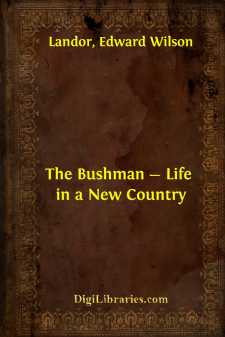Categories
- Antiques & Collectibles 13
- Architecture 36
- Art 48
- Bibles 22
- Biography & Autobiography 813
- Body, Mind & Spirit 142
- Business & Economics 28
- Children's Books 15
- Children's Fiction 12
- Computers 4
- Cooking 94
- Crafts & Hobbies 4
- Drama 346
- Education 46
- Family & Relationships 57
- Fiction 11828
- Games 19
- Gardening 17
- Health & Fitness 34
- History 1377
- House & Home 1
- Humor 147
- Juvenile Fiction 1873
- Juvenile Nonfiction 202
- Language Arts & Disciplines 88
- Law 16
- Literary Collections 686
- Literary Criticism 179
- Mathematics 13
- Medical 41
- Music 40
- Nature 179
- Non-Classifiable 1768
- Performing Arts 7
- Periodicals 1453
- Philosophy 64
- Photography 2
- Poetry 896
- Political Science 203
- Psychology 42
- Reference 154
- Religion 513
- Science 126
- Self-Help 84
- Social Science 81
- Sports & Recreation 34
- Study Aids 3
- Technology & Engineering 59
- Transportation 23
- Travel 463
- True Crime 29
The Bushman - Life in a New Country
Description:
Excerpt
PREFACE.
The British Colonies now form so prominent a portion of the Empire, that the Public will be compelled to acknowledge some interest in their welfare, and the Government to yield some attention to their wants. It is a necessity which both the Government and the Public will obey with reluctance.
Too remote for sympathy, too powerless for respect, the Colonies, during ages of existence, have but rarely occupied a passing thought in the mind of the Nation; as though their insignificance entitled them only to neglect. But the weakness of childhood is passing away: the Infant is fast growing into the possession and the consciousness of strength, whilst the Parent is obliged to acknowledge the increasing usefulness of her offspring.
The long-existing and fundamental errors of Government, under which the Colonies have hitherto groaned in helpless subjection, will soon become generally known and understood — and then they will be remedied.
In the remarks which will be found scattered through this work on the subject of Colonial Government, it must be observed, that the system only is assailed, and not individuals. That it is the system and not THE MEN who are in fault, is sufficiently proved by the fact that the most illustrious statesmen and the brightest talents of the Age, have ever failed to distinguish themselves by good works, whilst directing the fortunes of the Colonies. Lord John Russell, Lord Stanley, Mr. Gladstone — all of them high-minded, scrupulous, and patriotic statesmen — all of them men of brilliant genius, extensive knowledge, and profound thought — have all of them been but slightly appreciated as Colonial rulers.
Their principal success has been in perpetuating a noxious system. They have all of them conscientiously believed their first duty to be, in the words of Lord Stanley, to keep the Colonies dependent upon the Mother Country; and occupied with this belief, they have legislated for the Mother Country and not for the Colonies. Vain, selfish, fear-inspired policy! that keeps the Colonies down in the dust at the feet of the Parent State, and yet is of no value or advantage to her. To make her Colonies useful to England, they must be cherished in their infancy, and carefully encouraged to put forth all the strength of their secret energies.
It is not whilst held in leading-strings that they can be useful, or aught but burthensome: rear them kindly to maturity, and allow them the free exercise of their vast natural strength, and they would be to the parent country her truest and most valuable friends.
THE COLONIES OF THE EMPIRE ARE THE ONLY LASTING AND INALIENABLE MARKETS FOR ITS PRODUCE; and the first aim of the political economist should be to develop to their utmost extent the vast resources possessed by Great Britain in these her own peculiar fields of national wealth. But the policy displayed throughout the history of her Colonial possessions, has ever been the reverse of this. It was that grasping and ungenerous policy that called forth a Washington, and cost her an empire....


